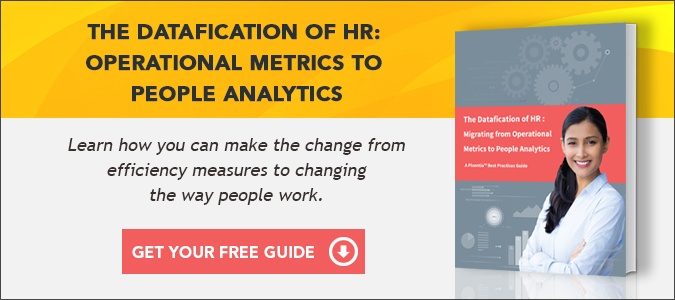
Humans have a long history of decision science. We have experienced centuries of study in statistics and probability, Operations Research in WWII, and the scientific method.
During the quality movement, we attempted to improve the decisions with consensus but soon found that increasing the number of decision-makers only introduced the errors of group dynamics.
Now we are in an era where sophisticated algorithms help us make business decisions. Marketing has led the way. Analysts can now predict where and when consumers will buy and what will induce them to buy more. Companies like Amazon can pre-position consumer goods in distribution centers with such efficiency they can promise next-day delivery.
As yet, only a small percentage of enterprises have been able to take advantage of predictive analytics in human capital management. We have seen well-publicized successes in predicting which candidates are more likely to be successful on the job. Companies have been able to predict which employees are most likely to leave, and they can plan interventions that reduce turnover with impressive cost savings.
Most people decisions are still made on “gut instinct” and experience. Leigh Buchanan and Andrew O'Connell, writing in Harvard Business Review a decade ago, laid out a strong argument for our preference for making decisions based on experience and emotional reaction. They describe how a gut decision created America’s insatiable desire to spend $6.00 on a cup of coffee, and another launched the hugely successful era of Chrysler muscle cars.
Leigh and O’Connell explain that we have a special reverence for gut decisions, not for the quality of the decisions, but the courage to make them. They cite a survey in which respondents “used intuitive skills as much as analytical abilities, but they credited 80% of their successes to instinct.”
The bias toward gut decisions explains why the director of a recruiting operation we talked with a few months ago said with firm conviction, “I don’t need a computer to tell me who will be a good hire.” Yet the evidence is that algorithms make better decisions than hiring managers.
Another factor is that some people we talk with question the ethics of making decisions that affect employees’ lives with machines. They wonder how well predictive analytics could suggest an ideal development path. And how often do we screen out applicants who only need the right leadership spark or learning opportunity to become high performers?
Perhaps we are right to question the quality of machine decisions. However impartial we might try to be, every human decision is based on the prejudices of the decision-maker, and every analytical algorithm has the biases of its creator.
In spite of what the futurists say, we do not believe machines will or should replace humans as decision makers. The best decisions will come from a partnership between data scientists and their machines, and the decision-makers responsible for results.
PhenomᵉCloud is a full-service technology company dedicated to helping clients solve business problems, improve the capability of their people, and achieve better results.
PhenomᵉCloud is a comprehensive technology solutions provider committed to empowering businesses to overcome challenges, enhance their workforce capabilities, and achieve superior outcomes.


Leave a Comment